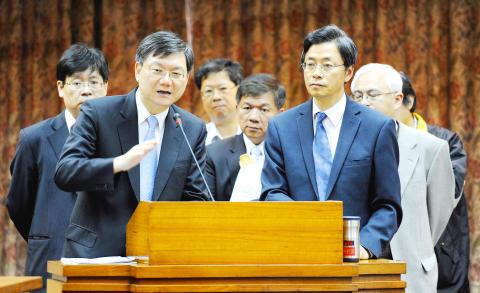Halting the construction of the Fourth Nuclear Power Plant could help Taiwan Power Co (Taipower) avoid bankruptcy, but terminating it permanently would ruin the company, Vice Minister of Economic Affairs Woody Duh (杜紫軍) said yesterday.
Duh made the remarks at a meeting of the legislature’s Education and Culture Committee to discuss the National Science Technology Program-Energy and developing alternative power sources to achieve energy independence and a nuclear-free homeland.
At the meeting, committee members questioned Duh about the possible impact of the Cabinet’s decision yesterday to halt construction on the No. 1 and No. 2 reactors at the plant in New Taipei City’s Gongliao District (貢寮), and seal the first one up after conducting safety inspections.

Photo: George Tsorng, Taipei Times
The vice minister said that while anti-nuclear protesters are concerned that “halting” construction is not the same as “terminating” it, both measures would have the same significant result of putting a stop to building for the moment, but that terminating plant entirely would bankrupt Taipower.
Duh said that project’s NT$283.8 billion (US$92 million) budget would be listed as a company loss if it is “terminated” for good and would therefore force Taipower to declare insolvency according to the Company Act (公司法).
However, if the project is only “halted” so the public can vote on it in the future, that sum would be listed as investment asset, he said.
“Taipower going bankrupt would not benefit anyone,” Duh said, adding that the cost of sealing the No. 1 reactor would be calculated by June.
As for the impact that ceasing construction could have on the supply and cost of electricity, the vice minister said that without a way to compensate for the Fourth Nuclear Power Plant not becoming operational, restrictions on electricity use could be imposed as early as 2021.
“The change in electricity prices would be calculated based on the difference between the cost of nuclear power-generated electricity and that of the amount generated by alternative energy sources to replace the power that was set to be generated by the Gongliao station,” he said.
Duh said electricity prices would increase by approximately 14 percent if the electricity that was to be supplied by the plant is generated by natural gas instead, with the hike set to be as high as 40 percent if the nation’s three operating nuclear power plants are retired.
Also at the meeting, Minister of Science and Technology Simon Chang (張善政) said that although studies have shown that there is sufficient combustible ice in the nation’s southwestern waters to generate electricity, the technology required to make this a viable energy source is not developed enough yet.

Taiwan is to commence mass production of the Tien Kung (天弓, “Sky Bow”) III, IV and V missiles by the second quarter of this year if the legislature approves the government’s NT$1.25 trillion (US$39.78 billion) special defense budget, an official said yesterday. Commenting on condition of anonymity, a defense official with knowledge of the matter said that the advanced systems are expected to provide crucial capabilities against ballistic and cruise missiles for the proposed “T-Dome,” an advanced, multi-layered air defense network. The Tien Kung III is an air defense missile with a maximum interception altitude of 35km. The Tien Kung IV and V

The disruption of 941 flights in and out of Taiwan due to China’s large-scale military exercises was no accident, but rather the result of a “quasi-blockade” used to simulate creating the air and sea routes needed for an amphibious landing, a military expert said. The disruptions occurred on Tuesday and lasted about 10 hours as China conducted live-fire drills in the Taiwan Strait. The Civil Aviation Administration (CAA) said the exercises affected 857 international flights and 84 domestic flights, affecting more than 100,000 travelers. Su Tzu-yun (蘇紫雲), a research fellow at the government-sponsored Institute for National Defense and Security Research, said the air

A strong continental cold air mass is to bring pollutants to Taiwan from tomorrow, the Ministry of Environment said today, as it issued an “orange” air quality alert for most of the country. All of Taiwan except for Hualien and Taitung counties is to be under an “orange” air quality alert tomorrow, indicating air quality that is unhealthy for sensitive groups. In China, areas from Shandong to Shanghai have been enveloped in haze since Saturday, the ministry said in a news release. Yesterday, hourly concentrations of PM2.5 in these areas ranged from 65 to 160 micrograms per cubic meter (mg/m³), and pollutants were

Taiwan’s armed forces have established response protocols for a wide range of sudden contingencies, including the “Wan Chun Plan” to protect the head of state, the Ministry of Defense (MND) said today. After US President Donald Trump on Saturday launched a series of airstrikes in Venezuela and kidnapped Venezuelan President Nicolas Maduro, concerns have been raised as to whether China would launch a similar “decapitation strike” on Taiwan. The armed forces regularly coordinate with relevant agencies and practice drills to ensure preparedness for a wide range of scenarios, Vice Minister of National Defense Hsu Szu-chien (徐斯儉) told reporters before a